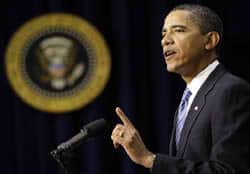St. Kitts PM and President Obama united in fight against drug trade and trans-national crime
BASSETERRE, St. Kitts – St. Kitts and Nevis’ Prime Minister the Rt. Hon. Dr. Denzil L. Douglas and United States President, the Honourable Barak Obama are on the same wave length in their commitment in working together to fight the drug trade and trans-national crime.
So says Acting Chief of Mission at the United States Embassy in Barbados, Mr. Brian Greaney.
“No nation, not even one the size of mine, can solve its problems alone. It’s up to all of our countries to work together, especially when the stakes are highest. Collective action is powerful,” he said.
Mr. Greaney continued: “As I am a U.S. Embassy representative, you would probably be forgiven for making bets on how long a speech like this could run before the inevitable quote from President Obama. Betting is now closed. Not too long ago a speech featured the following statement on the ability to succeed when a nation pulls together: I quote: ‘I think of all that our forebears endured; as I reflect on all the blessings that have been bestowed upon us as a people, and I think of the challenges that await; I think of the enormous power that resides within each and every one of us to be forces for good in this country.’
“President Obama has a deserved global reputation for eloquence and the ability to move the spirit, but the call to collective action I just read to you comes not from Washington, but instead from the Caribbean, from Prime Minister Douglas.
He was right. And he is not alone. My President issued the same call earlier this year when he said, ‘There is no challenge too great; no mission too hard. As long as we’re joined in common purpose, as long as we maintain our common resolve, our journey moves forward, [and] our future is hopeful’.”
Mr. Greaney told the opening session of the 18th Pre-IDC./Regional Drug Commanders Conference at the St. Kitts Marriott Resort that the countries of the hemisphere are in “this fight together not just because we have to be. We join forces together because we all stand for the same things.”
“The world once heard the following declaration about the international system, ‘Engagement will underpin a just and sustainable international order – just, because it advances mutual interest, protects the rights of all, and holds accountable those who refuse to meet their responsibilities.’ This declaration of the primacy of international cooperation has all the hallmarks of the highest aspirations of the United Nations system. But that’s not what it is. It is a promise laid out in the 2010 National Security Strategy of the United States, one that echoes the 67 year-old UN founding declaration that the nations of the world would, ‘promote social progress and better standards of life in larger freedom, and for these ends to practice tolerance and life together in peace with one another as good neighbors, and [crucially for everyone here today] to unite our strength to maintain international peace and security’.”
Pointing to the need to all countries in the region to work together, the United States official spoke of the seriousness challenge of transnational crime.
“Transnational criminal threats and illicit trafficking networks continue to expand dramatically in size, scope, and influence – posing significant national security challenges to all of our countries. These threats cross borders and continents and undermine the stability of nations, subverting government institutions through corruption and harming citizens worldwide. Transnational criminal organizations have accumulated unprecedented wealth and power through trafficking and other illicit activities, penetrating legitimate financial systems and destabilizing commercial markets. They extend their reach by forming alliances with officials and some state security services. For many countries around the world, the crime-terror nexus is a serious concern as terrorists use criminal networks for logistical support and funding. Increasingly, these networks are involved in cyber crime, which cost consumers billions of dollars annually, while undermining global confidence in the international financial system,” said Mr. Greaney.
He said combating transnational criminal and trafficking networks requires a strategy that safeguards citizens, breaks the financial strength of criminal and terrorist networks, disrupts illicit trafficking networks, defeats transnational criminal organizations, fights government corruption, strengthens the rule of law, bolsters judicial systems, and improves transparency.
“While these are major challenges, the United States seeks to devise and execute a collective strategy with other nations facing the same threats,” said the United States official.
“Between us, we do indeed have powerful forces with which to combat trafficking; but we must constantly coordinate and focus on action. We face an asymmetric situation. Traffickers are flush with cash and coordinate with each other easily and when they face an obstacle, they simply look for ways to evade it; whereas governments must respect the constraints that are inherent in societies governed by the rule of law and respect for neighbors,” said Mr. Greaney.


